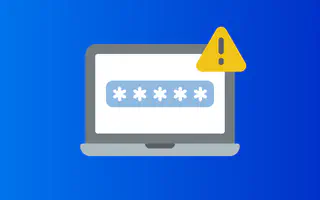Vu!n3r4b!3: Your password is its own worst enemy
May 2, 2024 by Nick Moran

It’s happened to you – you’ve gotten an email you didn’t expect saying your password has been reset. And then your account credentials have been changed. And then your social media profile, shopping account, or even bank portal spins out of control. It’s a burden to contact customer support and undo the damage, eating up your personal time and your sanity as you try to undo the damage this bad actor inflicted.
More than half (61 percent) of Americans have experienced an account breach at one point in their life, and 41 percent have had it happen to multiple accounts, per new reporting from U.S. News. With the majority of Americans using the same password across multiple accounts, just a single breach can wreak havoc on their digital lives.
 A lot of what users do to remember and protect their passwords is what does them in. For example, 41 percent of Americans physically write down their passwords to avoid forgetting them. Whether on a sticky note below their keyboard or in a notebook in their desk, writing down a password is often one of the easiest ways for a bad actor – a coworker, an overlooking patron in a coffee shop, or someone else – to quickly steal access to your accounts.
A lot of what users do to remember and protect their passwords is what does them in. For example, 41 percent of Americans physically write down their passwords to avoid forgetting them. Whether on a sticky note below their keyboard or in a notebook in their desk, writing down a password is often one of the easiest ways for a bad actor – a coworker, an overlooking patron in a coffee shop, or someone else – to quickly steal access to your accounts.
What many consider a stronger solution is a digital password manager, which serves as a virtual lockbox for your countless logins. While a step up in terms of security, researchers have outed popular platforms like 1Password, DashLane, LastPass and more as vulnerable to hacks and leaks, making it almost as risky as a physical password manager (like a sticky note). While server breaches are one cause for concern, compromising a user’s login information for a password manager is like handing a bad actor the key to a bank’s vault – giving them access to all of your sensitive logins and information.
 So what’s the root cause behind each of these problems? Usernames and passwords.
So what’s the root cause behind each of these problems? Usernames and passwords.
For decades, platforms have used user-entered logins as a way to access accounts and other information. While it’s the convenient digital status quo we all enjoy, it also offers avenues for breaches. Whether it be through brute force entry or compromised credentials, logins offer bad actors an opportunity to steal your data. And if there’s will, there’s a way. So what can you do?
No matter how sophisticated your solution is, the existence of usernames and passwords will always be a vulnerability. That’s why platforms like PassHub, powered by WWPass technology, take a different approach.
 PassHub is a virtual password manager that takes a new approach to security by eliminating usernames and passwords to log in. Instead, users rely on WWPass, a proprietary system that uses a physical device, such as your phone, to unlock your digital lockbox. There’s no information to enter when you log in – simply open your WWPass Key app, scan a secure QR code, and you’re in.
PassHub is a virtual password manager that takes a new approach to security by eliminating usernames and passwords to log in. Instead, users rely on WWPass, a proprietary system that uses a physical device, such as your phone, to unlock your digital lockbox. There’s no information to enter when you log in – simply open your WWPass Key app, scan a secure QR code, and you’re in.
On its face, it’s a simple, elegant solution to the root cause of the majority of breaches – removing the login portal most bad actors above. Under the hood, it’s a sophisticated system that blends industry-leading security standards with ease of use. And for you, it’s a new approach to your digital lifestyle that offers revolutionary peace of mind.
In celebration of World Password Day today, join PassHub today and enjoy digital security without the risks and hassles of usernames and passwords. Join PassHub to learn more.